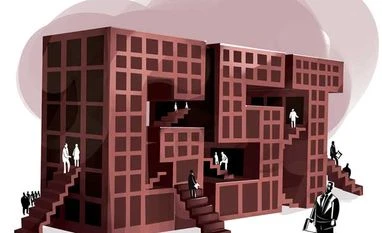Eager to meet the April 1 target to roll out the landmark Goods and Services Tax (GST), the government may advance Winter Session of Parliament by a fortnight to get supporting legislations passed, leaving sufficient time for implementation of the new indirect tax regime.
Winter Session of Parliament is normally convened in the third or fourth week of November but this year the government is looking at starting the month-long session immediately after the end of festive season.
An early Winter Session would help get the Central GST (CGST) and Integrated GST (IGST) legislations, that will pave way for the Goods and Services Tax (GST), to be approved within November or latest by early December, government officials said.
Maharashtra and Haryana are likely to follow suit soon and the requisite numbers may be in place by September, an official said.
"With required number of states ratifying the Bill, there is a thinking that the Winter Session should be advanced to around November 9 or 10, after the festivities, including Chhath Puja," he said. "In doing that, a consensus with all the political parties will be needed."
The government is of the view that once half of the state legislatures approve the new national sales tax regime, the GST Council - comprising Union finance minister and state finance ministers, can be nudged to quickly approve the tax rate, slabs and exemptions for it to be incorporated in the supporting legislations.
Parliament nod to the legislations in the Winter Session would give enough time to prepare for the rollout of GST from April 1, 2017. The new regime will subsume excise, service tax and other local levies including VAT, octroi.
Government is of the view that an early Winter Session will also be beneficial as the Budget Session is planned to be convened in the last week of January.
"Presentation of Budget around end-January is under consideration and hence an early Winter Session also paves way for an early Budget Session," the official said.
Winter Session of Parliament is normally convened in the third or fourth week of November but this year the government is looking at starting the month-long session immediately after the end of festive season.
An early Winter Session would help get the Central GST (CGST) and Integrated GST (IGST) legislations, that will pave way for the Goods and Services Tax (GST), to be approved within November or latest by early December, government officials said.
More From This Section
The two are supporting legislations to the Constitutional Amendment Bill approved in the Monsoon Session of Parliament. Requiring ratification by half of the 31 states for it to become a law, the Constitution Amendment Bill has already been ratified by eight state assemblies including Assam, Bihar, Chhattisgarh, Jharkhand, Himachal Pradesh, Gujarat, Delhi and Madhya Pradesh.
Maharashtra and Haryana are likely to follow suit soon and the requisite numbers may be in place by September, an official said.
"With required number of states ratifying the Bill, there is a thinking that the Winter Session should be advanced to around November 9 or 10, after the festivities, including Chhath Puja," he said. "In doing that, a consensus with all the political parties will be needed."
The government is of the view that once half of the state legislatures approve the new national sales tax regime, the GST Council - comprising Union finance minister and state finance ministers, can be nudged to quickly approve the tax rate, slabs and exemptions for it to be incorporated in the supporting legislations.
Parliament nod to the legislations in the Winter Session would give enough time to prepare for the rollout of GST from April 1, 2017. The new regime will subsume excise, service tax and other local levies including VAT, octroi.
Government is of the view that an early Winter Session will also be beneficial as the Budget Session is planned to be convened in the last week of January.
"Presentation of Budget around end-January is under consideration and hence an early Winter Session also paves way for an early Budget Session," the official said.
)